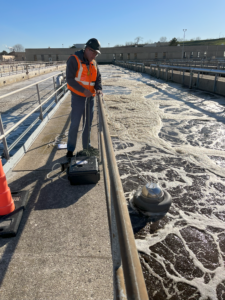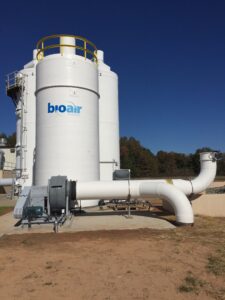Beyond the Equipment: What Sets Great Industrial Odor Control Engineers Apart
 Not all industrial odor control engineers work the same way. Some firms focus mostly on the equipment. Others take a broader view that includes field testing, permitting support, and long-term planning. At Webster Environmental Associates (WEA), we focus on helping our clients solve odor problems with practical, site-specific solutions—not one-size-fits-all systems. In this article, we’ll explain what makes experienced odor control engineers stand out and how that can affect results in the real world.
Not all industrial odor control engineers work the same way. Some firms focus mostly on the equipment. Others take a broader view that includes field testing, permitting support, and long-term planning. At Webster Environmental Associates (WEA), we focus on helping our clients solve odor problems with practical, site-specific solutions—not one-size-fits-all systems. In this article, we’ll explain what makes experienced odor control engineers stand out and how that can affect results in the real world.
Deep Testing and Accurate Data
No odor control plan should begin with equipment selection. It should begin with data. Good industrial odor control engineers take time to understand the full scope of the problem before offering solutions. At WEA, we start each project with detailed field testing. That often includes air sampling at multiple locations, liquid-phase sampling for compounds like hydrogen sulfide or ammonia, and in some cases, odor panel testing.
We also use air dispersion modeling when needed. This helps predict where odors will travel and how strong they will be at various points offsite. These insights are especially helpful when neighbors have complained or when public exposure needs to be reduced as part of a permit requirement.
Unlike firms that rely only on lab tests or basic estimates, WEA tailors all sampling and testing to real-world site conditions. This means the data we collect is more useful when selecting the right mix of treatment systems and when working with local regulators.
Technology-Neutral Guidance
Many companies that offer odor control services are also tied to one specific product line. They may only sell chemical scrubbers, or they may only recommend biofilters. That limits their ability to solve complex problems with the right tools.
At WEA, we are not tied to any single brand or system. We evaluate all major technologies, including chemical scrubbers, carbon adsorbers, biofilters, biotrickling filters, and liquid-phase additives. Our job is to select the option—or combination of options—that works best for your specific odor sources and site layout.
For example, we might recommend a biofilter for a steady load of organic odor, but also suggest chemical polishing for peaks during heavy flows. Some facilities need liquid treatment upstream, such as oxygen or peroxide dosing, to reduce the problem before it reaches the air. Because we’re independent, we focus on results, not product sales.
Understanding Permitting and Public Impact
Good industrial odor control engineers don’t just deal with equipment—they also help clients meet environmental goals and avoid public conflict. Odor problems can lead to complaints, media coverage, and even fines or lawsuits. Some facilities face tighter air quality rules or local ordinances that require documented plans.
WEA has worked with municipalities, private companies, and consulting engineers across the country to help meet these challenges. We help clients gather the right documentation, prepare for meetings with regulators, and explain system performance in plain terms.
We’ve also worked with facilities responding to community complaints. In some cases, we’ve helped reduce odor impact through simple design changes and improved monitoring. In others, we’ve used modeling and odor sampling to pinpoint the real source—allowing the site to focus efforts where they matter most.
Support Beyond Installation
 Some firms disappear after the system is installed. At WEA, we believe odor control works best when it’s monitored and supported over time. After startup, we provide follow-up visits to check performance, make adjustments, and answer questions.
Some firms disappear after the system is installed. At WEA, we believe odor control works best when it’s monitored and supported over time. After startup, we provide follow-up visits to check performance, make adjustments, and answer questions.
We also help clients with regular maintenance tasks. For example, biofilter media needs to be replaced on a cycle, and chemical systems may need adjustments to flow rates based on seasonal changes. When conditions at the site change—like a new process or shift in flow—we’re available to reassess and help optimize.
We also offer staff training and refreshers. Operators come and go, and newer team members may need guidance on sampling, chemical handling, or monitoring procedures. Our team can provide basic and advanced training depending on the need.
Checklist for Choosing the Right Consultant
If you’re considering hiring industrial odor control engineers, here are a few important questions to ask:
- What sampling methods do you use, and do you provide onsite testing?
- Are you tied to any single technology or equipment provider?
- How do you support permitting or address community concerns?
- Do you offer post-installation monitoring and maintenance support?
- Can you provide examples of past projects in similar industries?
Asking these questions early helps you find a partner that can support your needs long-term—not just deliver a quick fix.
Why Facilities Choose WEA
At Webster Environmental Associates, we’ve built a reputation for reliable, long-lasting odor control solutions. Our team brings together years of field experience, deep technical knowledge, and strong working relationships with regulators and engineering firms. We’ve worked on hundreds of systems across wastewater, industrial, and agricultural sites.
We don’t just sell a solution—we help you understand your odor problem, plan around your site’s limitations, and build a strategy that fits. Our work includes everything from early testing and system design to staff training and performance checks.
If you’re facing an odor issue or planning a system upgrade, contact WEA today. Our team of industrial odor control engineers can help you make informed choices and deliver results that last. Let’s talk about what’s possible for your site.
